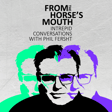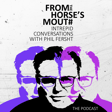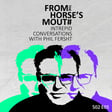
Dogs, Dial-Up, and Disruption: My conversation with Brian Solis
Are we stuck iterating when we should be innovating?
Brian Solis, Head of Global Innovation at ServiceNow, joins Phil Fersht on From the Horses' Mouth to unpack the AI paradox. Why is AI maturity declining even as capabilities explode? The answer lies in mindset—not models.
Brian argues that leaders must stop using AI to simply optimize yesterday’s processes and start reimagining what’s newly possible. It's not just about doing things faster—it's about doing entirely new things.
What You’ll Hear in 30 Minutes
- Why AI maturity actually dropped in 2024—and what it signals
- The difference between iteration and innovation in the age of AI
- Why rethinking jobs and workflows is now mission-critical
- How leadership must evolve from cost control to possibility design
- What it means to become an “AI-native” organization - Why the pressure to change needs to feel urgent—but be inspiring
Guest Snapshots
Brian Solis is the Head of Global Innovation at ServiceNow, where he leads a worldwide network of futurists and innovation officers focused on helping enterprises navigate disruption with clarity and purpose. A world-renowned digital anthropologist, Brian has published nine bestselling books and over 60 influential research reports on innovation, transformation, and emerging technologies. He’s been featured in HBR, Fast Company, CIO, and Forbes—and is consistently ranked among the top global voices in business innovation.
Timestamps
00:00 – Welcome & Brian’s Background
01:30 – From Disruptive Tech to Enterprise Innovation
03:25 – Brian’s First Generative AI Encounter
05:00 – Building the AI Maturity Model at ServiceNow
06:40 – Why AI Maturity Scores Are Falling
07:50 – From Quick Wins to Business Transformation
09:35 – Connecting Silos with AI (Not Just Automating)
11:00 – Reimagining Work, Not Replacing It
13:20 – Helping Employees Become AI-Native
15:20 – Leadership’s Role in Inspiring AI-Driven Change
18:10 – Linear vs. Exponential Thinking
20:30 – Free Time, Dark Leisure & Organizational Curiosity
22:20 – Why Most Companies Still Think Like It’s Web 1.0
24:45 – Iteration ≠ Innovation
26:50 – AI as an Extension of Human Creativity
28:10 – Who Will Win: Services or Software?
30:15 – Cost Center or Growth Engine? You Decide
34:00 – Sign Off & Canine-Approved Conclusion
Explore More
• Brian Solis on LinkedIn: https://www.linkedin.com/in/briansolis/
• Brian's Latest Book: https://www.briansolis.com/books/
• ServiceNow AI Index Report: https://www.servicenow.com
• Phil Fersht on LinkedIn: https://www.linkedin.com/in/pfersht/
• More from HFS on Agentic AI: https://www.hfsresearch.com








